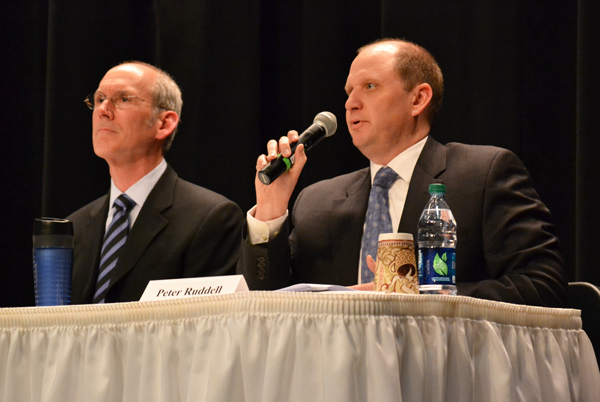
By Tara Cavanaugh
Governor Rick Snyder’s proposed education plan went through the ringer at a public education forum Monday night at Pioneer that drew the attendance of lawmakers, teachers, administrators and community members.
Among the many topics discussed were school funding, charter schools and online classes under Snyder’s Public Education Finance Act (PEFA).
The panel leading the discussion included State Board of Education President John Austin, State BOE member Eileen Lappin Weiser, Michigan State University Professor of K-12 Administration David Arsen, and lobbyist and lawyer Peter Ruddell, who is the principal drafter of the plan along with the Oxford Foundation.
According to the PEFA website, the plan proposes an “any time, any place, any way, any pace” education model, performance-based funding, and funding that follows the student to all the schools he or she attends, instead of being locked down to one district.
“I think your zip code should not choose which schools you attend,” Ruddell said Monday night. He added that students should not be “trapped in the district they reside” and that the plan would provide incentives for students to graduate early.
But Professor Arsen argued that the plan would give students more academic options largely through online instruction in order to cut down on transportation costs between schools. Arsen said that research has not showed students benefit more from online instruction.
When a parent in the audience pressed the panel on the effectiveness of online education, Weiser said only about ten percent of students truly benefit from online instruction.

Arsen also pointed out that the governor’s plan would not help school districts fund infrastructure. “Michigan is one of the few states where the state offers no state aid for school facilities, which means they’re funded totally by local property taxes,” Arsen said. “Community to community, you can see the vast differences in the facilities.”
Arsen said that the state currently does support local districts that borrow money for infrastructure by guaranteeing their loans–– but in less than a year the state will no longer do this, “effectively ending public school facility instruction in nearly every district.”
Ruddell acknowledged that those who drafted the proposed plan did not consider capital projects or infrastructure.
Another issue that proved contentious Monday night was charter schools. Gov. Snyder and the Republican-led legislature have already allowed more charter and online schools in Michigan, and the education plan continues down that road. According to Arsen, the plan was designed to operate in conjunction with the House Bill 5923, which would allow entities like private businesses and cultural institutions to establish public schools in virtually any location with little oversight. It would also remove enrollment restrictions on cyber schools and would allow some schools to use selective admissions (such as all-girls or all-boys schools). The bill is currently stalled in the House Education Committee.
One of the hopes behind expanding options for students is that choice schools need to compete, and thus offer better options. Professor Arsen disagrees. “Choice schools attract lower-cost students,” he said Monday night. “There’s no incentive in the governor’s proposal for the good things that public schools provide, such as libraries and reading specialists and special education.”
Only five percent of Michigan’s schools are charters, said Weiser. “We should see what works in charter schools and cross-pollinate those practices into public schools.”
But Arsen noted that less than half of students in Detroit attend Detroit Public Schools –– most attend some form of charter, and most change schools on a yearly basis. And Weiser was incorrect: overall, 30 percent of the district’s public schools are now charters.
State Senator Hoon-Yung Hopgood, who represents Michigan’s 8th district, asked the panel about the effects of continued state funding cuts to public education. Per-pupil funding has been reduced by $2600 since 2002, or 24 percent.

“We are foolishly cutting taxes,” said State BOE President Austin. “If we went back to taxes under Gov. Engler, we would have $3 billion more for our schools.”
Weiser noted that more spending isn’t always linked to higher achievement, adding incorrectly that Michigan is between eighth and 14th in the nation when it comes to funding schools but in the bottom half of achievement.
Michigan was once in the top ten for education funding, Arsen said, but according to the most recent data from 2009, the state was 25th.
“In Ann Arbor, we’re facing a $17 to 20 million budget reduction for next year alone, after all that’s already been cut,” said AAPS Superintendent Dr. Patricia Green after the panel concluded. “We’re into the bone. And when we hear the kind of pieces of legislation that could still be out there that could even further devastate what we’re trying to protect and enrich for our young people, it makes one pause and take a deep breath and say: Where will the moneys come from next? What will have to be cut?
“We want to provide a world-class education for our young people,” Dr. Green said. “All of them.”
“I think that it’s very telling that nearly everyone at the state board level, or so they claimed, and in our community agrees that the way to improve education in Michigan is through teacher support, teacher prep, and appropriate teacher evaluation,” said AAPS BOE President Deb Mexicotte.
“And yet not a single piece of new funding, new legislation or reform has come forward on these except at the end: the teacher evaluation piece. Nothing for support, nothing on training, nothing on looking at the 90 percent of our teachers who are doing a whale of a job, but only focusing on those ten percent and then treating everyone else as if they are amongst that number.”
AAPS parent Donna Mahoney also voiced her frustration. “When you hear that we’re cutting $17 to $20 million, you think, from where? I don’t understand how they claim that our state is recovering.”



All State officials who are appointed to oversee State of Michgian K-12 educational funding (and who accept the role) should be required to have a child enrolled in and attending a public school—including the Governor. Not all can afford private schools as he can. Public education for all has been the reason for this country’s rise as a major world economic power. We will not continue to be such without quality K-12 education for all.
As well, one should not make decisions on something they have no knowledge of, direct experience with, or meaningful and relevant investment in. Like declaring war—-one who has been to war would never declare war as wrecklessly as Federal leaders have during the recent decades–i.e. Cheney for Bush and as supported by the latter. Neither ever went to war and were very clever at avoiding such during their generation..
I attended the forum on March 11 and submitted a written question. We were told that answers to our submitted questions would be posted. Where can I find these Q&A’s?
So, Snyder keeps bragging about his surplus. This is where it is coming from? This and seniors and middle class…. he has to go. We can only educate all voters on what Snyder is doing.